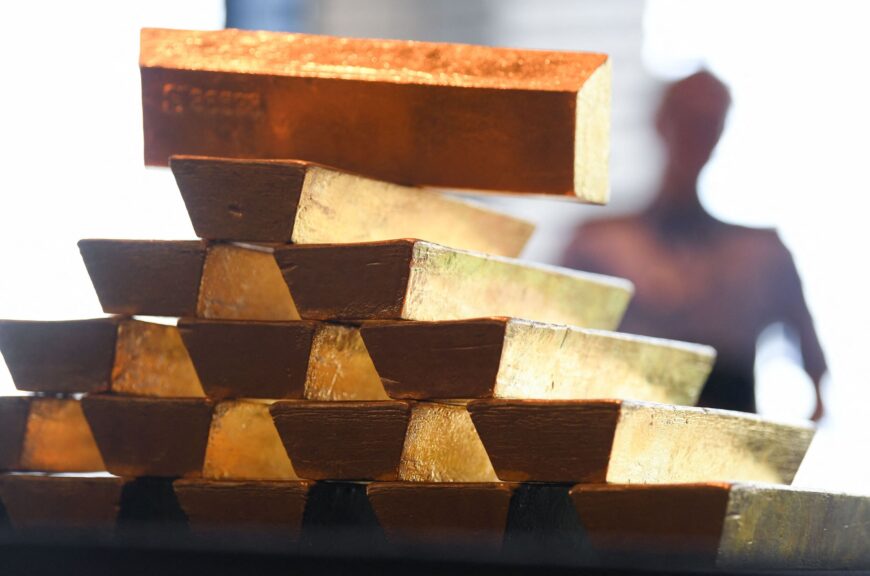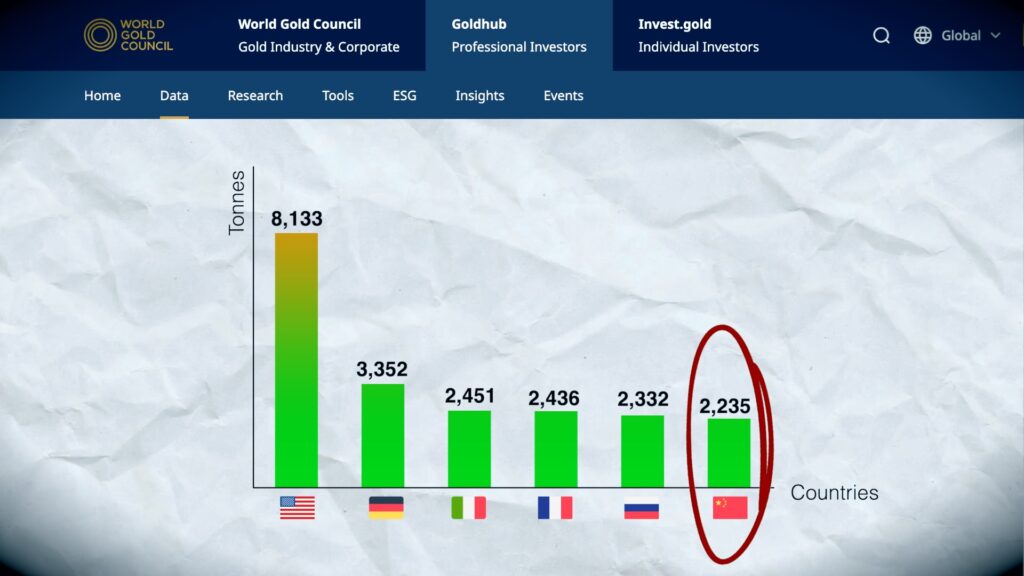
Officially, the United States leads the world in gold reserves, and China ranks number six. However, China has hidden its actual gold holdings in quasi-government accounts. One expert said China’s gold reserves are 2.4 times the reported volume. Others believe the real amount of gold that the Chinese regime owns is more than 10 times its declared amount. Beijing has guarded its actual gold reserve as a top secret.
Gold prices have been going up. Many people have rushed to buy gold. Governments have also been buying gold—particularly the Chinese government. The regime has been covertly hoarding gold and scooping up gold resources globally, even though official numbers don’t show it.

As of the end of 2023, the United States holds 8,133 metric tons of gold, accounting for 22.71% of the world’s reserves, followed by Germany, Italy, France, and Russia. China, with 2,235 tonnes, ranks sixth. However, people believe that China’s actual gold reserve is much higher.
According to Jan Nieuwenhuijs, an expert on the Chinese gold market, Beijing’s actual gold reserves exceed 5,300 tonnes, 2.4 times the officially disclosed amount. This makes China rank second after the United States.
According to his estimates, in 2023, China’s central bank, which is the People’s Bank of China, purchased a record 735 tonnes of gold. This is more than 3 times the official purchase of 225 tonnes. He believes that China may be the driving force behind the recent rise in world gold prices. [On March 21, Nieuwenhuijs wrote (on the “Gainesville Coins” website)
According to another expert, Dominic Frisby, China has twice as much as the United States and leads the world in gold reserves. Here are the reasons he gave.
The World’s Largest Gold Producer
In 2007, China surpassed South Africa to become the leading gold producer globally, a position it has maintained ever since. Over the last decade, China has contributed roughly 15% to the total global gold production.
Since 2000, China has produced approximately 6,830 tonnes of gold. A significant portion of its gold production is state-owned, with the China National Gold Group Corporation alone accounting for 20%. More importantly, China retains the gold that it mines since exporting domestically mined gold is prohibited. So, China’s gold reserve should be augmented by roughly 6,830 tonnes.
Scooping Up Gold Resources Globally
Due to diminishing domestic reserves, Chinese mining enterprises have been expanding their footprint internationally since the 2010’s, and when the world succumbed to COVID-19 in 2020, Chinese mining companies had a shopping spree. Based on data from a 2021 Reuters report, Chinese mining companies spent roughly $753 million in 2020, scooping up gold assets around the world.
State-owned Shandong Gold Mining won a nine-month bidding war for the Ghana gold mine Cardinal Resources in 2020. Zijin Mining acquired Guyana Goldfields and Colombia-focused Continental Gold. During the acquisition, Zijin outbid Silvercorp by 35% to clinch Guyana Goldfields and paid a 29% premium for Continental. The Chinese companies snatched these gold assets as if money didn’t matter because the Chinese state provided financing to them. The high prices the Chinese miners paid have driven up global gold prices over time.
In February 2023, Chinese mining giant Zijin Mining also bought the Rosebel gold mine in Suriname, one of the largest gold reserves in South America. Last November, Chaarat Gold Holdings, a gold mining company with a site in Armenia and assets in Kyrgyzstan, announced that [1] it signed a contract with the Power Construction Corporation of China for a gold mining project in Kyrgyzstan. With these international gold mining assets, China’s international production of gold has exceeded domestic outputs by about 15 tonnes as of 2020.
Largest Importer of Gold
China not only remains the foremost gold producer but also stands as the largest gold importer. Although not all gold imports are officially declared, Frisby said that the Shanghai Gold Exchange is the primary conduit for most gold entering China, whether imported, mined, or recycled—including gold imported from Hong Kong. Therefore, withdrawals from the Shanghai Gold Exchange (SGE) can serve as a rough indicator of the overall demand for gold, and it is quantifiable. According to him, the exchange has seen withdrawals exceeding 22,000 tonnes since 2008.
However, not all gold entering China is accounted for by SGE withdrawals. Another gold expert, Ross Norman, points out that China’s central bank, or PBOC likes to buy 12.5kg gold bars, which don’t trade on the Shanghai Gold Exchange. He said that the PBOC often uses dollars on gold exchanges in London, Dubai, and Switzerland, while the SGE sells its gold in Chinese yuan. And gold imports from Dubai and Switzerland are not always declared.
Hidden Gold Reserves
Like how Beijing maintains shadow foreign reserves through its state-controlled commercial banks and large state-owned enterprises (SOEs), the state may have a shadow gold reserve held by its military and government agencies. The People’s Liberation Army (PLA) owns gold and doesn’t need to declare gold purchases.
State agencies such as the State Administration of Foreign Exchange and China Investment Corporation – the sovereign wealth fund, for example, also own gold, according to Frisby. In addition, the World Council has estimated that privately held gold jewelry in China was around 2,500 tonnes, and the CCP may regard privately owned gold as its assets if gold becomes a weapon.
When adding everything together, experts say China has 30,000 to 35,000 tonnes of gold held by different entities, some in private hands and some in government accounts. Ross Norman believes that the Chinese government controls 50% of the total. Other experts believe that the amount controlled by the government can be higher.
Based on the above numbers, we can estimate that the Chinese regime roughly controls between 15,000 and 19,000 tonnes of gold, twice as much as the U.S. gold reserves. The CCP has kept it a secret because announcing it would devalue the dollar, thus shrinking Beijing’s gigantic trillions of foreign reserves. When the CCP ultimately shows its hand, it will challenge the dollar’s supremacy. Frisby believes that China is slowly introducing its gold assets to devalue the U.S. dollar over time.
“If China goes to war with the U.S., it will weaponize money,” Frisby claimed. “If China wants the yuan to be the global reserve currency, all it has to do is make it freely tradable with gold.”
However, I think there is great risk in the CCP’s strategy. First, gold has appreciated approximately 36% over the past five years, while the S&P 500 has increased 60%. Gold prices fluctuate, and its return on investment isn’t backed by tangible business growth when compared to stocks and bonds. So, it isn’t always a stable investment.
Secondly, if gold prices are driven up by the CCP’s abnormal purchasing activities, the high prices aren’t sustainable in the long run because the demand is hyped up. Like China’s real estate market, it creates a bubble that can burst. So far, China, Russia, and the countries along the Belt and Road have been buying gold as a hedge against the dollar. However, if the American government controls its debt and the 2024 election goes smoothly, and when democratic countries don’t follow the Chinese gold rush, China will suffer losses when gold prices fall.
Also, due to corruption, China’s actual gold reserve may be less than what our calculation has stated. Recently, a gold store in Beijing went bankrupt, leaving dozens of customers unable to retrieve their collective 60 kilos of gold worth 21 million yuan held at the store. The closed shop is a China Gold franchise store. China Gold is the only SOE in the gold industry.
Similar incidents also happened in Shandong, where customers lost their precious metals held at bankrupt gold retailers and jewelers. Where did the gold go? I won’t be surprised if some of it has left China. There are also reported cases of fake gold bars and fake gold jewelry, and even state-owned banks are selling phony gold.
Watch Lei’s full video here:







